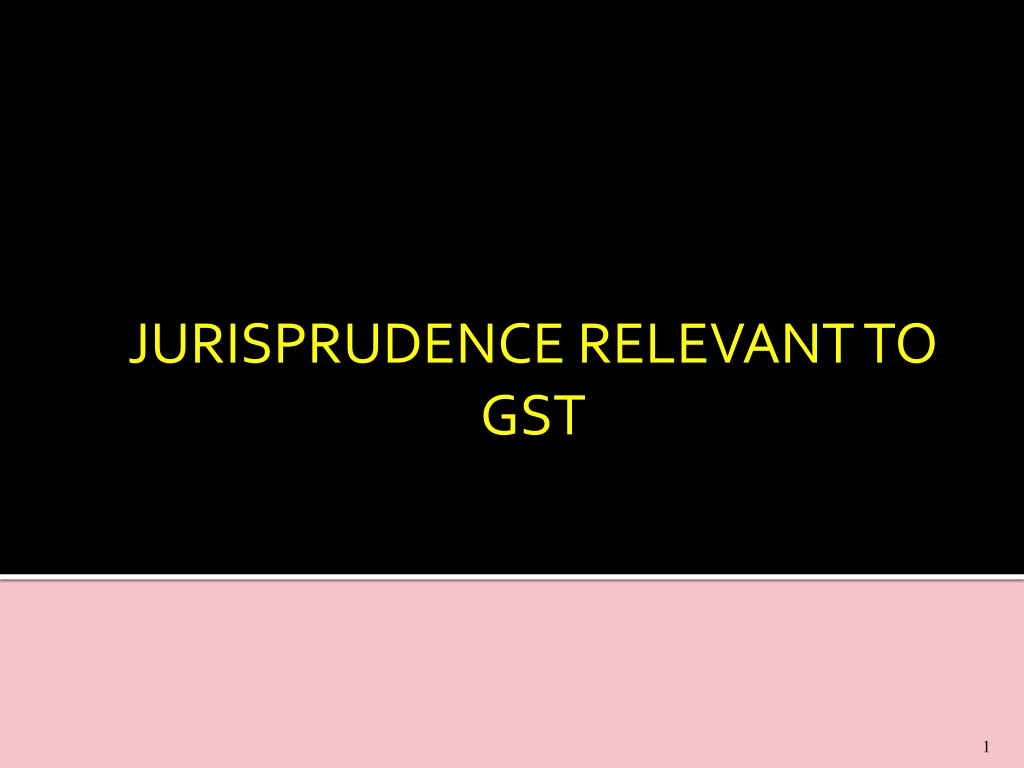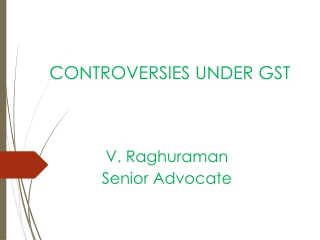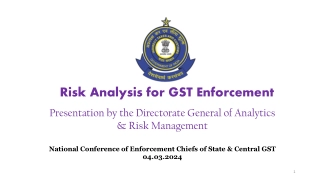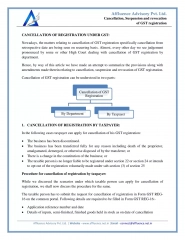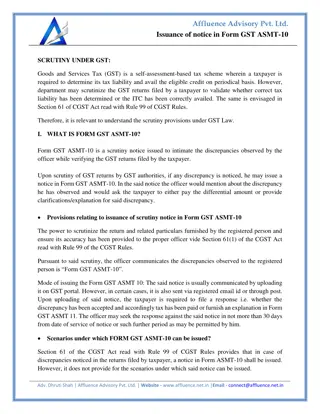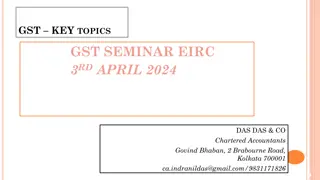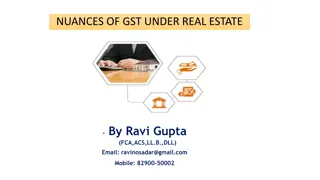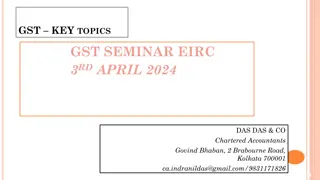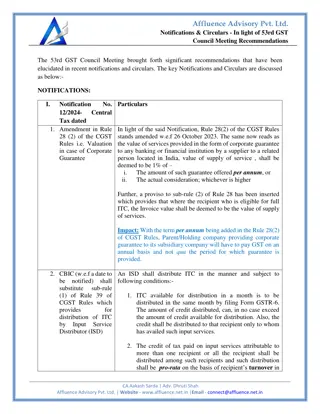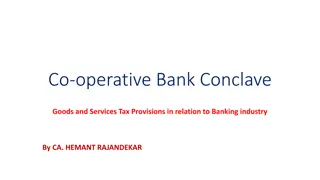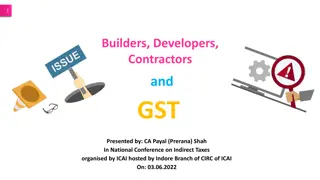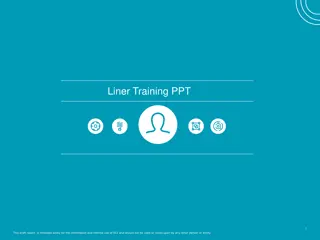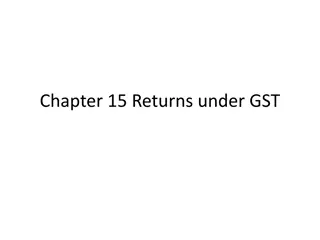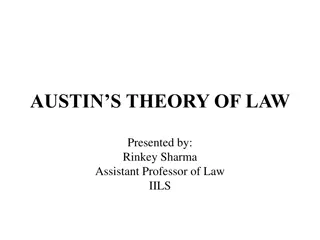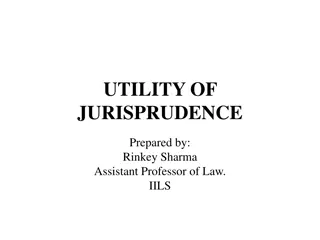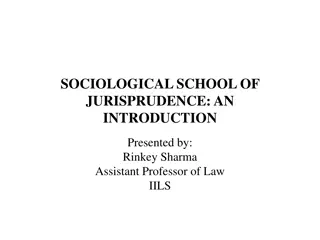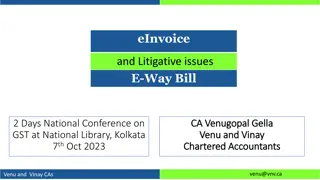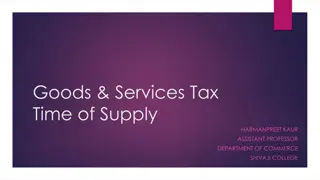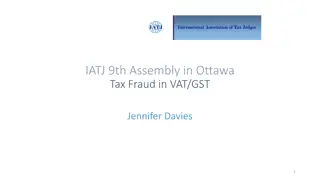Insights on GST Jurisprudence Relevant Cases
Explore significant judgments like State of Maharashtra v. Suresh Trading Company and UOI v. Bharti Airtel Ltd. highlighting the importance of relying on registration certificates, the doctrine of "Lex non Cogit Ad impossibilia", and the self-assessment obligations under the GST Act. These cases emphasize the rights and obligations of registered persons, clarifying concepts crucial for understanding GST jurisprudence.
Download Presentation

Please find below an Image/Link to download the presentation.
The content on the website is provided AS IS for your information and personal use only. It may not be sold, licensed, or shared on other websites without obtaining consent from the author. Download presentation by click this link. If you encounter any issues during the download, it is possible that the publisher has removed the file from their server.
E N D
Presentation Transcript
State of Maharashtra v. Suresh Trading Company [1998] 109 STC 439 (SC) - A purchasing dealer is entitled by law to rely upon the certificate of registration of the selling dealer and to act upon it. Whatever may be the effect of a retrospective cancellation upon the selling dealer, it can have no effect upon any person who has acted upon the strength of a registration certificate when the registration was current. The argument on behalf of the department that it was the duty of persons dealing with registered dealers to find out whether a state of facts exists which would justify the cancellation of registration must be rejected. To accept it would be to nullify the provisions of the statute which entitle persons dealing with registered dealers to act upon the strength of registration certificates. LGW Industries Ltd. v. Union of India - [2022] 134 taxmann.com 42 (Calcutta) - If it is found upon considering the relevant documents that all the purchases and transactions in question are genuine and supported by valid documents and transactions in question were made before the cancellation of registration of those suppliers and after taking into consideration the judgments of the Supreme Court and various High Courts which have been referred in this order and in that event the petitioners shall be given the benefit of input tax credit in question. 2
The doctrine of "Lex non Cogit Ad impossibilia" means the law does not compel a man to do anything vain or impossible or to do something which he cannot possibly perform. Indian Hotel and Restaurant Association vs State of Maharashtra, (2019) 3 SCC 429; Collector of Central Excise vs. Decent Dyeing Co. - 1990 (45) ELT 201 (S.C.); Jharkhand High Court in the case of Commissioner of C. Ex., East Singhbhum v. Tata Motors Ltd. - 2010 SCC OnLine Jhar 1526; Denying ITC to a buyer of goods and services would tantamount to treating both the guilty purchasers and the innocent purchasers at par whereas they constitute two different classes. A guilty purchaser entering into a tacit agreement or understanding or arrangement in collusion with the guilty seller to falsely claim ITC and cause loss of revenue therefore the same cannot be treated at par with a bona fide purchaser. This is violative of Article 14 of the Constitution inasmuch as it treats both the innocent purchasers and the guilty purchasers alike. The Hon ble Supreme Court in the case of Commissioner of Trade & Taxes, Delhi and others Vs. Arise India Limited and others [TS-2-SC-2018- VAT], dismissed the Special Leave Petition No(s). 36750/2017 filed by the Revenue against the decision of the Hon ble High Court of Delhi in On Quest Merchandising India Pvt. Ltd. Versus Govt. of NCT of Delhi - 2018 (10) G.S.T.L. 182 (Del.) Deputy Commissioner of Income Tax & Anr. Vs. Pepsi Foods Ltd. (2021) 7 SCC 413. ) 3
UOI Versus Bharti Airtel Ltd. - 2021 (54) G.S.T.L. 257 (- S.C.) As per the scheme of the 2017 Act, it is noticed that registered person is obliged to do self- assessment of ITC, reckon its eligibility to ITC and of OTL including the balance amount lying in cash or credit ledger primarily on the basis of his office record and books of account required to be statutorily preserved and updated from time to time. That he could do even without the common electronic portal as was being done in the past till recently pre-GST regime. The common portal is only a facilitator to feed or retrieve such information and need not be the primary source for doing self-assessment. The primary source is in the form of agreements, invoices/challans, receipts of the goods and services and books of account which are maintained by the assessee manually/electronically. These are not within the control of the tax authorities. Every assessee is under obligation to self-assess the eligible ITC under Section 16(1) and 16(2) and credit the same in the electronic credit ledger defined in Section 2(46) read with Section 49(2) of the 2017 Act. Only thereafter, Section 59 steps in, whereunder the registered person is obliged to self-assess the taxes payable under the Act and furnish a return for each tax period as specified under Section 39 of the Act. To put it differently, for submitting return under Section 59, it is the registered person who has to undertake necessary measures including of maintaining books of account for the relevant period either manually or electronically. On the basis of such primary material, self-assessment can be and ought to be done by the assessee about the eligibility and availing of ITC and of OTL, which is reflected in the periodical return to be filed under Section 59 of the Act. 4
Cement and steel used in construction of new jetties and other commercial buildings entitled for input credit - Mundra Ports & Special Economic Zone Ltd. Versus C.C.E. & CUS. - 2015 (39) S.T.R. 726 (Guj.). M.S. plate, channel, angle, beam for fabrication of capital goods entitled for CENVAT credit - UOI Versus Associated Cement Co. Ltd. - 2016 (341) E.L.T. 175 (Chhattisgarh). Cement although specified in Fifth Schedule, since it is used for laying foundation and erection of cement manufacturing plant and machinery, prior to commencement of commercial production, constitutes part and parcel of plant and thus capitalgoods used for manufacturing of cement - J.K. Cement Works Versus State Of Karnataka - 2017 (7) G.S.T.L. 408 (Kar.). Railway track installed within plant for transporting hot metal was handling system for raw material and processed material and therefore it was held to be integral part of process of manufacturing as without activity for which railway tracks are used, manufacturing/commercial production of pig iron was not possible. Hence, railway tract was capital goods, on which assessee was entitled to take credit of duty paid by them - Jayaswal Neco Ltd. Versus Commissioner of Central Excise, Raipur - 2015 (319) E.L.T. 247 (S.C.) 5
Assessee is entitled to ITC also on invisible loss of input during manufacturing process- R.K. Ganapathy Chettiar Versus Assistant Commissioner (St), Kangeyam - 2022 (56) G.S.T.L. 129 (Mad.). Physical presence in final product is not pre-requisite to claim credit- Flex Engineering Ltd. Versus Commissioner Of Central Excise, U.P. - 2012 (276) E.L.T. 153. Cenvat credit not deniable when inputs destroyed in fire accident - Commr. Of C. Ex., Chandigarh Versus Chandigarh Petro Foam (P) Ltd. - 2017 (350) E.L.T. 246 (P & H). Credit not deniable on short receipt of inputs - Commr. Of Central Excise, Allahabad Versus Hindalco Industries Ltd. - 2017 (349) E.L.T. 211 (All.). Cenvat credit admissible on Combo pack of different items for sales promotion - Cello Home Products Versus Commissioner of Central Excise, Daman - 2012 (284) E.L.T. 52 (Tri. - Ahmd.) Cenvat credit admissible on Playing cards supplied as a free gift along with final product - Manik Machinery Manufacturers P. Ltd. Versus C.C.E., MUMBAI-IV - 2016 (339) E.L.T. 334 (Tri. - Mumbai) 6
ITC need not pertain to same Taxperiod of Output Tax Liability - Kirloskar Electric Co. Ltd. Versus State of Karnataka - 2018 (16) G.S.T.L. 564 (Kar.). Attested certified copy of Triplicate copy of Bill of Entry is valid duty paying document for availing credit - Shasun Chemicals and Drugs Ltd. v. CESTAT - 2018 (11) G.S.T.L. J39 (Mad.). Petitioner bought SIM cards which were charged tax at a higher rate than what the goods were liable to suffer tax. It was held that for the purpose of claiming ITC, it was not relevant what was the exact rate of tax payable as per the scheduled rates, what is relevant is the amount of tax actually paid by the assessee on purchase of goods. - R.K. DISTRIBUTORS v. COMMISSIONER COMMERCIAL TAX (2019- VIL-03-ALH); VISTEON AUTOMOTIVE v. DEPUTY COMMISSIONER (2020-VIL- 264-MAD); Modvat credit on capital goods as well as depreciation under Income-tax Act taken simultaneously inadvertently but revised income tax return filed - credit admissible - Abhishek Synthetics Pvt. Ltd. Versus Commissioner Of C. Ex., Hyderabad- III - 2005 (182) E.L.T. 339 (Tri. - Bang.) 7
Oswal Agro Mills Ltd. v. Collector of Central Excise [1993 (66) E.L.T. 37 (S.C.)]. in absence of statutory definitions, they have to be construed according to their common parlance understanding. Indo-International Industries v. Commissioner of Sales Tax, U.P. [1981 (8) E.L.T. 325 (S.C.)] - It is well settled that in interpreting Items in statutes like the Excise Tax Acts or Sales Tax Acts, whose primary object is to raise revenue and for which purpose they classify diverse products, articles and substances resort should be had not to the scientific and technical meaning of the terms or expressions used but to their popular meaning, that is to say, the meaning attached to them by those dealing in them. Wrong classification of the goods in question by the respondents at one stage, does not operate as estoppel/res judicata against them for claiming the classification under the correct tariff heading/subheading of the GST tariff at a late stage - Plasmac Machine Manufacturing Co. v. CCE, 1991 Supp (1) SCC 57; N.V.K. MOHAMMED ROWTHER & SONS [2021 (50) G.S.T.L. 151 (Mad.)], Commissioner Of Central Excise; Bhopal Versus Mahakoshal Potteries reported in 2005 (183) E.L.T. 289 (Tri. - Del.), 8
Commissioner of Central Excise, Bhopal v. Minwool Rock Fibres Ltd. - 2012 (278) E.L.T. 581 - In case of classification, entry which is beneficial to the assessee requires to be applied. In the matter of classification of goods, if two views are possible, the view that benefits the assessee should be adopted. It is a well-settled principle of law that if there is ambiguity with regard to the rate of tax to be collected, the benefit should go to the assessee. - Mauri YeastIndia Pvt. Ltd. v.State of U.P. reported in [2008] 14 VST 259 (SC), Poulose and Mathen v. Collector of Central Excise reported in [1997] 3 SCC 50, theHon ble Supreme Court ; Commissioner of Trade Tax,U.P.v. S.S. Ayodhya Distillery [2009] 19 VST 251 (SC); [2009] 233 ELT 146 (SC) It is a well established principles of law in the matter of classification of goods in taxing statutes that when an article is classifiable under a specific item in the Tariff Schedule it would be against the very principle of classification to consign it to general category. Speedway Rubber Co. V. Commissioner, Central Excise and others reported in [2004] 137 STC 503 (SC) ; State of Maharashtra V. Bradma of India Ltd. reported in [2005] 140 STC 17 (SC); COMMISSIONER OF COMMERCIAL TAX, U.P. Versus A.R. THERMOSETS (PVT.) LTD. reported in 2016 (339) E.L.T. 500 (S.C.) 9
Honble SC in the case of Government Of Kerala & Anr. Vs Mother Superior Adoration Convent - 2021-VIL-43-SC analysed long line of judgments on interpretation of exemption notification in tax statutes and held that 5-Judge Bench judgment in Commr. of Customs v. Dilip Kumar & Co. (2018) 9 SCC 1 did not refer to the line of authority which made a distinction between exemption provisions generally and exemption provisions which have a beneficial purpose. It was held by the Hon'ble Supreme Court that even in tax statutes, an exemption provision should be liberally construed in accordance with the object sought to be achieved if such provision is to grant incentive for promoting economic growth or otherwise has some beneficial reason behind it. It was held that residential accommodation for nuns and hostels for students would be eligible for exemption when Section 3(1)(b) of the Kerala Building Tax Act, 1975 exempted buildings that are used principally for religious, charitable or educational purposes or as factories or workshops from building tax under the Act. It was observed that the beneficial purpose of the exemption contained in Section 3(1)(b) must be given full effect to. We must first ask ourselves what is the object sought to be achieved by the provision, and construe the statute in accord with such object. And on the assumption that any ambiguity arises in such construction, such ambiguity must be in favour of that which is exempted. 10
Metal Forgings Versus Union Of India reported in 2002 (146) E.L.T. 241 (S.C.) - Each and every communication or order could be construed as a show cause notice. Riddhi Siddhi Collection Versus UOI - 2019 (368) E.L.T. 852 (Bom.) - The objective of giving show cause notice is not an empty formality. Oryx Fisheries Pvt. Ltd. v. Union of India 2011 (266) E.L.T. 422 (S.C.) - while reading a show-cause notice the person who is subject to it must get an impression that he will get an effective opportunity to rebut the allegations contained in the show cause notice and prove his innocence. Court in exercise of its jurisdiction under Art. 226 of the Constitution i.e. writ jurisdiction will interfere with a show cause notice in the following circumstances: When the show cause notice ex facie or on the basis of admitted facts does not disclose the offence alleged to be committed; When the show cause notice is otherwise without jurisdiction; When the show cause notice is contrary to judicial decisions or decisions of the Tribunal; 11
Asstt. Commissioner Commercial Tax Department v. Shukla & Bros. - 2010 (254) E.L.T. 6 (S.C.) - The principle of natural justice has twin ingredients; firstly, the person who is likely to be adversely affected by the action of the authorities should be given notice to show cause thereof and granted an opportunity of hearing and secondly, the orders so passed by the authorities should give reason for arriving at any conclusion showing proper application of mind. Violation of either of them could in the given facts and circumstances of the case, vitiate the order itself. Kishan Lal v. UOI [1998] 97 Taxman 556 (SC), a speaking order reduces arbitrariness. A reasoned order speaks for itself. It embodies in itself the principles of natural justice. In Diamond Shipping Company Ltd. v. CC - (2017) 358 E.L.T. 108 (Cal) - The impugned order in original is appealable. The petitioner has chosen not to prefer an appeal therefrom. The scope of inference with an order passed by an authority acting under a statute can be summarized as (i) concerned has acted in breach of principles of natural justice (ii) without jurisdiction (iii) if the impugned order is demonstrated to be perverse (iv) if the impugned order is vitiated by fraud or bias or malice and (v) order is non-speaking. if the authority impugned order is if the impugned 12
R.B. Shreeram Durga Prasad & Fatehchand Nursing Das v. Settlement Commission - [1989] 43 Taxman 34 (SC) - an order passed without giving an opportunity of hearing is a nullity being passed in violation of principles of natural justice. West Asia Maritime Ltd. Versus Asstt. Commr. Of GsT & C. Ex., Chennai - 2021 (49) G.S.T.L. 351 (Mad.) - Order passed by Statutory Authority even though not appealed against within the maximum period of limitation before the concerned Appellate Authority, can be challenged in a writ petition under Article 226 of Constitution of India if the challenge falls under any one of the exceptions. Dabur India Ltd. v. State of U.P. reported in AIR 1990 SC 1814 - We would not like to hear from a litigant in this country that the Government is coercing citizens of this Country to make payment of duties which the litigant is contending not to be leviable. Government, of course, is entitled to enforce payment and for that purpose to take all legal steps but the Government, Central or State, cannot be permitted to play dirty games with the citizens of this country to coerce them in making payments which the citizens were not legally obliged to make. If any money is due to the Government, the Government should take steps but not take extra legal steps or manoeuvre. 13
In Century Metal Recycling Pvt. Ltd. vs. Union of India reported in 2009 (234) E.L.T. 234 (P & H), maintained by the Hon ble Apex Court in 2009 (244) ELT A57 (SC), the Hon ble Punjab and Haryana High Court observed that unless there is assessment and demand, the amount deposited by the petitioners cannot be appropriated. No justification has been shown for retaining the amount deposited, except saying that since it was voluntarily deposited. In view of this admitted position, the petitioners are entitled to be returned the amount paid. Gokak Patel Volkart Ltd. vs. CCE, Belgaum -1987 (28) ELT 53 (SC) - No notice seems to have been issued in this case in regard to the period in question. Instead thereof an outright demand had been served. An opportunity to be heard is intended to be afforded to the person who is likely to be prejudiced when the order is made. Notice is thus a condition precedent to a demand. Neelkamal Realtors Power Pvt. Ltd. Versus Union Of India reported in 2019 (31) G.S.T.L. 53 (Bom.) - The events as well as the material placed on record lead us to conclude that the respondents have acted in a high handed manner and forced the Petitioners under the threat of arrest to reverse the Cenvat Credit of Rs. 11.25 crores before the show cause notice was issued or before any adjudication order thereon was passed. In these circumstances, we direct the respondents to allow the Petitioners to recredit the amount of Rs. 11.25 crores. 14
